- Home
- Octavia E. Butler
Fledgling Page 8
Fledgling Read online
Page 8
“To enjoy the memory of killing … How many people?” I demanded.
“Seventy-eight. Everyone except you.”
I wet my lips, looked away from him, remembering the cave. “Maybe only seventy-seven,” I said. I wanted badly not to say it, but somehow, not saying it would have made me feel even worse.
Iosif touched me, put his hand on my chin and turned my head so that I faced him. He or someone else had done that before. It felt familiar and steadying. He had straight, collar-length white-blond hair framing his sharp, narrow face and large gray eyes with their huge dark-adapted pupils. He still didn’t look familiar. I didn’t know him. But his touch no longer alarmed me.
I said, “Someone found me as I was waking up in the cave. I don’t know how long I’d been there. Several days, at least. But finally, I was regaining consciousness, and someone found me. I didn’t know at the time that it was … a person, a man. I didn’t know anything except … I killed him.” I couldn’t bring myself to say the rest—that I’d not only killed the man, but eaten him. It shamed me so much that I moved my face away from his fingers, took a step back from him. “I still don’t know who he was, but I remember the sounds he made. I heard them clearly, although at the time I didn’t even recognize what he said as speech. Later, when I was safe with Wright, I was able to sort through the memories and understand what he said. I think he knew me. I think he’d been looking for me.”
“What did he say?” Wright asked. He had moved closer to me.
It was terrible that he was hearing this. I shut my eyes for a moment, then answered his question. “He said, ‘Oh my God, it’s her. Please let her be alive.’”
There was silence.
Iosif sighed, then nodded. “He wasn’t from here, Shori, he was from my community.”
I looked at him and saw his sorrow. He knew who the man was, and he mourned him. I shook my head. “I’m sorry.”
To my surprise, Wright pulled me against him. I leaned on him gratefully.
“I sent my people out to hunt,” Iosif said. “We thought you would have survived, if anyone did. Only one of my men didn’t come back from the search. We never found him. Where is your cave?”
I turned to look around, then described as best I could where the cave was. “I can take you there,” I said.
Iosif nodded. “If his remains are still there, I’ll have them collected and buried.”
“I’m sorry,” I repeated, my voice not much more than a whisper.
He stared at me, first with anger and grief, then, it seemed, only with sorrow. “You are, aren’t you? I’m glad of that. You’ve forgotten who and what you are, but you still have at least some of the morality you were taught.”
After a while, Wright asked, “Why did you think she had a better chance of surviving?”
“Her dark skin,” Iosif said. “The sun wouldn’t disable her at once. She’s a faster runner than most of us, in spite of her small size. And she would have come awake faster when everything started. She’s a light sleeper, compared to most of us, and she doesn’t absolutely have to sleep during the day.”
“She said she thought she was an experiment of some kind,” Wright said.
“Yes. Some of us have tried for centuries to find ways to be less vulnerable during the day. Shori is our latest and most successful effort in that direction. She’s also, through genetic engineering, part human. We were experimenting with genetic engineering well before humanity learned to do it—before they even learned that it was possible.”
“We, who?” I asked.
“Our kind. We are Ina. We are probably responsible for much of the world’s vampire mythology, but among ourselves, we are Ina.”
The name meant no more to me than his face did. It was so hard to know nothing—absolutely nothing all the time. “I hate this,” I said. “You tell me things, and I still don’t feel as though I know them. They aren’t real to me. What are we? Why are we different from human beings? Are we human beings? Are we just another race?”
“No. We’re not another race, we’re another species. We can’t interbreed with them. We’ve never been able to do that. Sex, but no children.”
“Are we related to them? Where do we come from?”
“I think we must be related to them,” he said. “We’re too genetically similar to them for any other explanation to be likely. Not all of us believe that, though. We have our own traditions—our own folklore, our own religions. You can read my books if you want to.”
I nodded. “I’ll read them. I wonder if they’ll mean anything to me.”
“You’ve probably suffered a severe head injury,” Iosif said. “I’ve heard of this happening to us before. Our tissue regenerates, even our brain tissue. But memories … well, sometimes they return.”
“And sometimes they don’t.”
“Yes.”
“I know I had a head wound—more than one. The bones of my skull were broken, but they healed. How can we survive such things?”
He smiled. “There’s a recently developed belief among some of our younger people that the Ina landed here from another world thousands of years ago. I think it’s nonsense, but who knows. I suppose that idea’s no worse than one of our oldest legends. It says we were placed here by a great mother goddess who created us and gave us Earth to live on until we became wise enough to come home to live in paradise with her. Actually, I think we evolved right here on Earth alongside humanity as a cousin species like the chimpanzee. Perhaps we’re the more gifted cousin.”
I didn’t know what to think—or say—about any of that. “All right,” I said. “You said the Ina people live in single-sex groups—men with men and women with women.”
“Adults do, yes. Young males leave their mothers when they’re a little older than you are now. They live the last years of their childhood and all of their adult years with their fathers. I’m the only surviving son of my father’s family so my sons have only one father. Our human symbionts may be of either sex, but among us, sons live with brothers and fathers. Daughters live with their mothers and sisters. In a case like this, though, since you’re not fully adult, you would be welcome to join my community for a while—until you get your memories back or relearn the things you need to know and until you come of age.”
“I live with Wright.”
“Bring him with you, of course, and any others you’ve come to need. I’ll have a house built for you and yours.”
I looked at Wright and was not surprised to see that he was shaking his head. “I have a job,” he said. “Hell, I have a life. Renee … Shori will be all right with me.”
Iosif stared at him with an expression I couldn’t read. “And you will teach her about her people and their ways?” he said. “You’ll teach her her history, and help her into the adulthood she is approaching? You’ll help her find mates and negotiate with their family when the time comes?” He stood straight and gazed down at Wright. He wasn’t that much taller than Wright, but he gave the impression of looking down from a great height. “Tell me how you will do these things.” he said.
Wright glared at him, his expression flickering between anger and uncertainty. Finally, he looked away. After a moment, he shook his head. “Where?” he asked.
“A few miles north of Darrington.”
“I’d want to keep my job.”
“Of course. Why not?”
“It’s a long way. We’d … have a house?”
“You’d be guests in my house until your house is finished. We’re interested in keeping Shori safe and teaching her what she needs to know to get on with her life. You’re already a greater part of her life than you realize.”
“I want to be with her.”
“I want you with her. But tell me, what’s your life been like with her? What do your friends and neighbors think about your relationship with her?”
Wright opened his mouth, then closed it again. He stared an Iosif angrily.
Iosif nodded. “You’ve been hi
ding her. Of course you have—lest someone think you were having an improper relationship with a child. Once you’re living with us, there will be no need to hide. And to us, there is nothing improper about your relationship.”
Eight
That same night, Iosif flew Wright and me up to see the community that was to become our new home. As we arrived, we could see from the air five large, well-lit, two-story houses built along what was probably another private road. There were also two barns, several sheds and garages, animal pens, and fields and gardens, all a few miles north of the lights of a small town—Darrington, I assumed.
Iosif promised to fly Wright and me back to the ruin later that night so that we could pick up Wright’s car and go back to his cabin. If things went as Iosif intended, we would move in a week. He gave us each a card that showed his address and phone numbers and that gave directions for driving to his community. He said he would send a truck and two people to help load Wright’s things onto it. Anything that didn’t fit in our temporary quarters could be stored in one of the barns until our house was ready.
“You live in such out-of-the-way places,” Wright complained. “This is even more isolated than the other one. I’m going to have a hell of a commute. I don’t know whether it’s going to be possible.”
Iosif ignored him. When we landed on a large paved area not far from the largest of the houses, he said, “You need to know that it’s best to avoid cities. Cities overload our senses—the noise, the smells, the lights … They overload us in every possible way. Some of us get used to it, but others just get sick.”
“That’s a surprise,” Wright said. “The movies I’ve seen and the books I’ve read say vampires like cities—that their large populations makes it easy for vampires to be anonymous.”
Iosif nodded. “Vampires in books and movies usually seem to be trying to kill people or trying to turn them into vampires. Since we don’t do either of those things, we don’t need cities. Fortunately.” Iosif turned and jumped out of his side of the helicopter, while Wright slid out the other side, then reached in and lifted me out. Then Wright quickly caught up with Iosif and stood in his path like a human wall.
“I want to know what’s going to happen to me,” he said. “I need to know that.”
Iosif nodded. “Of course you do.” He glanced at me. “How long have you two been together?”
“Eleven days,” I said.
“My God,” Wright said. “Eleven days? Is that all? I feel as though I’ve had her with me for so much longer than that.”
“And yet you’re healthy and strong,” Iosif said. “And you obviously to want to keep her with you.”
“I do. I’m not entirely sure that it’s my idea, but I do. What will I become, though? What have I become? You said she’ll … find a mate. What happens to me then?”
“You are her first symbiont, the first member of her new family. Her mating can’t change that. She’ll visit her mates and they’ll visit her, but you’ll live with her. No one could separate the two of you now without killing you, and no one would try.”
“Killing me …? Why would I die? What would I die of?”
“Of the lack of what she provides.”
“But what—?”
“Come into the house, Wright. I’ll see that you get all the answers you need. You might not like them all, but you have a right to hear them.”
We walked from the side to the front of the large house. Iosif’s community was clearly nocturnal. The Ina were naturally nocturnal, and their symbionts had apparently adjusted to being awake at night. There were lights on in all the houses, and people—human symbionts and their children, I guessed—moved around, living their lives. A red-haired woman was backing a car out of a garage. She had a small, red-blond baby strapped into a special seat in the back. Two little boys were raking leaves, and pausing now and then to throw them at one another. They were my size, and I wondered how old they were. A little girl was sweeping leaves from a porch with a broom that was almost too big for her to manage. A man was on a ladder, doing something to the rain gutter of one of the houses. Several adults stood talking together in one of the broad yards.
Wright and I followed Iosif into the biggest house and found ourselves in a room that stretched from the front to the back of the house. Wright’s whole cabin might have filled a third of it. There were several couches, several chairs large and small, and several little tables scattered around the room.
Iosif said, “We meet here on Sunday evenings or when there’s something that needs community-wide discussion.”
There was a broad picture window on the backyard side of the great room; it ran across the top half the wall from one end of the room to the other. At one of the end walls, there was a huge fireplace where a log burned with much snapping and sparking. Books filled built-in bookcases on the two remaining walls.
In a corner near the fireplace, two men and a woman—all human—sat at a small table, their heads together, talking quietly. There were steaming cups of coffee on the table. There was no light in the room except the fire. Iosif walked us over to the three people.
“Brook, Yale, Nicholas.”
They looked up, saw me, and were on their feet at once, staring. “Shori!” the woman said. She came around her chair and hugged me. She was a stranger as far as I was concerned, and I would have drawn away from any possibility of a hug, but she smelled of Iosif. Something in me seemed to accept her. She smelled of someone I had decided was all right. “My God, girl,” she said, “where have you been? Iosif, where did you find her?”
Both men looked at me, then at Wright. One of them smiled. “Welcome,” he said to Wright. “Looks like Shori was able to take care of herself.”
Iosif put his hand on my shoulder as the woman let me go. “Is any of this familiar to you? Do you know these people, this house?”
I shook my head. “I like the room, but I don’t remember it.” I looked at the three people. “And I’m sorry, but I don’t remember any of you either.”
All three of them stared at Iosif.
“She was very badly injured,” he said. “Head injuries. As a result, she’s lost her memory. And she was alone until she found Wright Hamlin here. I’m hoping her memory will return.”
“Don’t you have your own medical people?” Wright asked. “People who know how to help your kind?”
“We do,” Iosif said. “But for Ina, that tends to mean someone to fix badly broken bones so that they heal straight or binding serious wounds so that they’ll heal faster.”
“You don’t want to see what they mean by ‘a serious wound,’” one of the men said. “Intestines spilling out, legs gone, that sort of thing.”
“I don’t,” Wright agreed. “Shori told me she had been badly burned as well as shot. But she healed on her own. Not a scar.”
“Except for not knowing herself or her people,” Iosif said. “I would call that a large scar. Unfortunately, it’s not one we know how to fix.”
“Did I have friends here?” I asked. “People who might know me especially well?”
“Your four brothers are here,” he said. He looked at the three humans. “Look after Wright for a while,” he said. “Answer fully any questions he asks. He’s with Shori now. He’s her first, but he knows almost nothing.” He took my arm and began to lead me away.
“Renee?” Wright said to me, and I stopped. It eased something in me to hear him call me by the name he had given me. “You okay?” he asked.
I nodded. “Yell if you need me. I’ll hear.”
He nodded. He looked as though my words eased something in him.
I followed Iosif down a long hallway.
“These bedrooms belong to me and my human family,” he told me. “They’re the three you just met and five others who aren’t here right now. They’ve all been with me for years. Eight is a good number for me, although at other times in my life I’ve had seven or even ten. I’m wealthy enough to care for all of them if I have to, and
they feed me. They’re free to hold jobs away from the community, even live elsewhere part time, and sometimes they do. But at least three of them are always here. They work out a schedule among themselves.”
We went through a door at the end of the hallway and out onto a broad lawn. I stopped in the middle of the lawn. “Do they mind?” I asked.
“Mind?”
“That you need eight. That none of them can be your only one.” I paused. “Because I think Wright is going to mind.”
“When he understands that you have to have others?”
“Yes.”
“He’ll mind. I can see that he’s very possessive of you—and very protective.” He paused, then said, “Let him mind, Shori. Talk to him. Help him. Reassure him. Stop violence. But let him feel what he feels and settle his feelings his own way.”
“All right.”
“I suspect this kind of thing needs to be said more to my sons than to you, but you should hear it, at least once: treat your people well, Shori. Let them see that you trust them and let them solve their own problems, make their own decisions. Do that and they will willingly commit their lives to you. Bully them, control them out of fear or malice or just for your own convenience, and after a while, you’ll have to spend all your time thinking for them, controlling them, and stifling their resentment. Do you understand?”
“I do, yes. I’ve made him do things but only to keep him safe—mostly to keep him safe from me—especially when Raleigh Curtis shot me.”

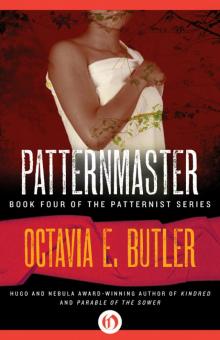 Patternmaster
Patternmaster Survivor
Survivor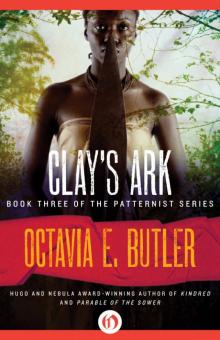 Clay's Ark
Clay's Ark Bloodchild and Other Stories
Bloodchild and Other Stories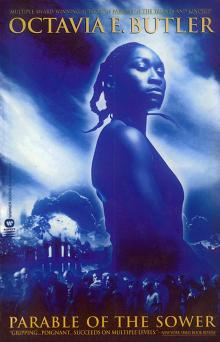 Parable of the Sower
Parable of the Sower Wild Seed
Wild Seed Fledgling
Fledgling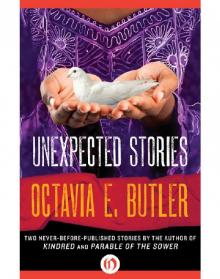 Unexpected Stories
Unexpected Stories Kindred
Kindred Lilith's Brood: Dawn / Adulthood Rites / Imago
Lilith's Brood: Dawn / Adulthood Rites / Imago Adulthood Rites
Adulthood Rites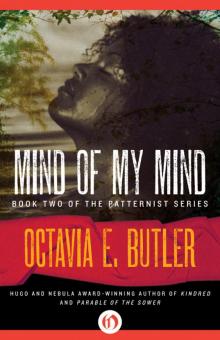 Mind of My Mind
Mind of My Mind Seed to Harvest
Seed to Harvest Lilith's Brood: Dawn, Adulthood Rites, and Imago (Xenogenesis Trilogy)
Lilith's Brood: Dawn, Adulthood Rites, and Imago (Xenogenesis Trilogy) Bloodchild
Bloodchild Seed to Harvest: Wild Seed, Mind of My Mind, Clay's Ark, and Patternmaster (Patternist)
Seed to Harvest: Wild Seed, Mind of My Mind, Clay's Ark, and Patternmaster (Patternist)